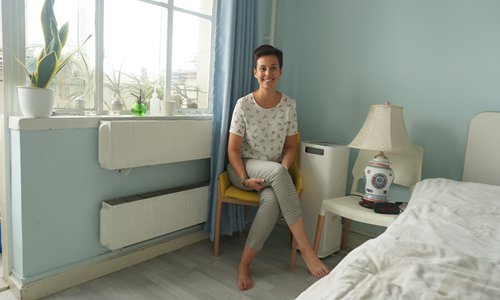How much rent does an expat pay and are they happy renting in the capital?

Recent data shows that the average rent-to-salary ratio in Beijing is 58 percent. Some expats say they are not surprised because rent is expensive in Beijing. Photo: IC
Helena Javitte, 28, from France has just moved into her new apartment in Xinyuan Xili in Chaoyang district. It is her third apartment in her four years in Beijing.
For Javitte, who works at Sanlitun SOHO and commutes via scooter, a convenient location is the top priority, followed by the apartment and its price in that order. Her rent is about 40 percent of her wages, but she thinks it's worth the convenience.
"I'm willing to spend more money than average on the apartment," she said.
According to a recent report released by Shanghai-based E-house China R&D Institute, the average rent-to-income ratio in Beijing is as high as 58 percent, followed by Shenzhen, Guangdong Province with 54 percent, Sanya, Hainan Province with 48 percent and Shanghai with 48 percent.
The figure has triggered discussions. Many people find it hard to believe that rent can eat so much out of an individual's wages, while others argue that it's not news. They see it as a natural outcome of the high housing costs. Yan Yuejin, director of the institute, said that non-salary income, anything of monetary value given to an employee that is outside their base salary, such as health insurance, is not included in the calculation, which causes the number to be higher.
Nonetheless, renting in the city is becoming costlier for young Beijingers.
Metropolitan asked expats living in Beijing what percentage of their wages is their rent and whether there were any financial and cultural factors behind their choices. Several expats from different backgrounds shared how much they are willing to pay for apartments in Beijing, what they look for in apartments, what matters the most when renting, and how their living habits have changed since living in China.

Helena Javitte Photo: Yin Lu/GT
Getting your priorities straight
"I'm not looking for a house. I'm looking for a home," Javitte said. She checked out 30 apartments over three months before finding the one she just moved into.
Her friends are often impressed by how much she invests in a rented apartment. She has been cleaning and rearranging things until 2 am every day for two weeks. The apartment is in a building built in the 1990s. It has two rooms, and Javitte is trying to convert one of them into a living room.
She is not surprised that the ratio is as high as 58 percent. What surprises her is the fact that some of her friends earn 20,000 yuan ($3,001) a month and would pay no more than 4,000 yuan for rent. According to her, some of her friends just want a place to stay, while others focus more on the quality of their friendship with their flatmates.
"It's pretty rare when I spend time at home. So, when I arrive home, I really need to feel very good, really cozy," said Javitte. On top of her full-time job, Javitte runs French Lab, a community for young French professionals in Beijing.
"There are a lot of new arrivals in Beijing who expect cheap rent. I don't expect that," Javitte said.
According to her, "a decent 'foreigner standard' place in Dongzhimen," a popular choice among new expats which is located between Gulou and Sanlitun, costs about 8,000 yuan per month.
When she first arrived in Beijing, Javitte chose to share a three-bedroom apartment with two other expats in Shuangjing, Chaoyang district.
"What I wanted was to make friends then," she said.
Renting on a budget
Di, 26, a PhD student from Kazakhstan who majors in mathematics at the Beijing Institute of Technology, sees cost as one of the most important factors when choosing an apartment but said having a roommate whom she gets along well with is also crucial.
"I need someone like-minded. Nationality, age, work place and others are not important for me," she said.
Just like many other foreign newcomers to the city, Di's first roommate was also an expat, her classmate from Cambodia. They communicated largely through gestures in the beginning and later became very good friends.
Di moved to the university's campus in Fangshan district for the second year of her PhD program.
"Apartments in Fangshan are not very expensive. So, I decided to have more space and freedom," she said. She shared a two-bedroom newly renovated apartment near the campus at with a Chinese classmate. It cost them 2,500 yuan a month.
She recently found a nice two-bedroom apartment at 4,800 yuan in Chaoyang district. It is not very close to her university, but it suits her needs, she said.
"I just want a comfortable and not noisy home surrounded by trees, where I can relax after study," she explained.
For her, the current rent-to-income ratio is about 50 percent.
As for facilities, Di puts a nice kitchen ahead of everything else. "In Beijing, I miss my country's food," she said.
The rent situation in Kazakhstan is different from in Beijing, Di said. There's no deposit, and the rent is paid monthly. People don't go to agencies to get apartments. In Beijing, an agency's commission is often one month's rent.
Di found her previous apartments via agencies, but this time she decided to save the money and avoid agents. Not to mention that the rent is much pricier in Beijing.
"But I can understand why. It's because it is Beijing, one of the biggest cities in the world," she said.

The majority of the expats living in Beijing see their rental as more than just a place to lay their head, says insider. Photo: IC
What money can buy
Although their budgets are very different, Serge Platkovskiy shares the same priorities with Di. For Platkovskiy, a Russian and a chef who has been living in Beijing for more than 20 years, having good roommates is the most important.
"It (being roommates) is a commitment," he said.
He and his old roommate are both tidy people who are willing to invest in the apartment and renovate it. He has been living in the same apartment in Shuangjing for four years. The two-story, two-bedroom apartment with a view of CBD on the rooftop has gone through multiple renovations. The rent is 14,000 yuan each.
"I always overpay for apartments because I need to have friends over, make new friends, and host events with musicians and artists," he said.
As somebody who values the quality of his living space, Platkovskiy understands why people pay so much for their rent, and he is not surprised that the rent-to-salary ratio in Beijing is as high as 58 percent.
Part of the reason Beijing has the highest ratio, he said, is the rental market.
"Houses in Beijing are very bad, and a lot of them are bought but not kept as actual spaces to live in. They are just an investment," he said.
By contrast, the market and rent culture in Shanghai is more mature, he said.
"Construction is super cheap in China, But Beijingers still don't really care. People have spoiled the landlords in Beijing," he said.
Platkovskiy plans to continue renting a while. He might buy a property eventually, but there is no rush. "I think it's too late to invest. You cannot get much margin as you did 10 years ago," he said.
But he thinks the traditional mindset about owning property is changing, and a lot of young Chinese have started to care less about owning property.
Do expats spend more on rent?
Platkovskiy is currently looking for a new roommate, somebody who also plans to spend a long time here. He is looking mainly via WellCee Rental, a rental information platform.
"Expats are willing to spend more on rent," said Lu Junzuo, the founder of WellCee, which has been up and running since January. The agency-free platform currently caters to 20,000 landlords, leaseholders and apartment seekers in Beijing, mostly through WeChat groups. Half of them are expats from more than 100 countries.
How people from different countries view rented apartments varies, he explained.
"Many Chinese see a rented apartment as no more than just a bed, while many foreigners see it as a very important part of their lives. Expats attach great importance to the condition of the public spaces, including the kitchen and the living room," Lu said.
He added that although many expats prefer sharing an apartment with friends, sharing one bedroom or even a bed still only exists among Chinese renters.
Saving money is very important for many Chinese, and their savings will often go into buying houses, Lu said, while "most expats are willing to spend on living, even though it might mean they have to live and eat in a simple way."
"But the rent culture is slowly changing in China," Lu said. New policies come up, incomes grow, and the young generation, mostly the post-1980s and 90s, have developed more personalized needs and form the majority of the market.
Related policies have been announced to cool down the housing market and give tenants the same rights as homeowners so that the rental market will develop in a healthier way. On July 20, nine government bodies, including the Ministry of Housing and Urban-Rural Development, jointly announced a pilot program to ensure that renters enjoy the same rights as homeowners, including the opportunity to enroll their children in schools in the area.
The rising rent in downtown areas and their need to socialize have been driving expats out of some traditional expat neighborhoods, such as Sanlitun, Gulou and Wudaokou, into more remote areas.
According to Lu, a few new expat communities are forming in several locations, including several neighborhoods in Shunyi district and Shaoyaoju and Sunhe in Chaoyang district. He is confident that rental prices will be more reasonable.
"It will be slow. Changing user habits like this takes time," Lu said.
Zhou Ruxuan contributed to the story
Newspaper headline: Foreign tenants
Comments
Post a Comment